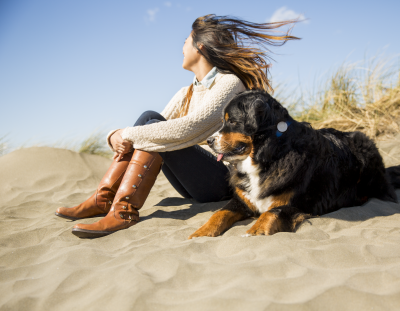
A dog spends quality time on the beach with its owner while sporting a Whistle activity tracker. Photo courtesy of Whistle.
ANNAPOLIS—Some dog owners with particularly plump, furry friends may be paying special attention to their pets’ holiday season calorie intake — and their energy output.
Owners who slide their dogs extra helpings of Thanksgiving treats aren’t doing their pets any favors, some experts say.
“Some people give way too much of a portion to their dogs,” said Mikkel Becker, a Seattle-based trainer at vetstreet.com. “You can feed your pet during the holiday, but do it in a low-calorie way.”
Trips to the veterinarian tend to increase during the holiday season, according to experts.
“We get a pretty good rush after holidays like Thanksgiving,” said Dr. Sharon Albright of South Arundel Veterinary Hospital in Edgewater, Maryland. “We experience a few days of increased gastrointestinal distress.”
In addition to watching their dogs’ calorie intake, owners are now turning to a new method of monitoring their pets’ fitness: activity trackers.
First used by humans looking to improve their fitness levels, trackers are now being used on dogs to monitor how much they move throughout the day. Activity trackers are particularly useful for concerned pet owners who don’t believe their pets are getting enough exercise on a regular basis.
Whistle, a pet technology company based in San Francisco, sells their tracker for about $100. Whistle’s brand of monitors includes Wi-Fi and Bluetooth components, allowing owners to monitor their dogs’ activity levels while away from home. Users can download an app, on Apple or Android devices, that syncs with the 16-gram, 1.5-inch wide device that attaches to the dog’s collar, according to the company’s site (www.whistle.com)
“People think chubby dogs are cute,” said Julia Waneka, Whistle’s communication director. “But a few pounds can actually make a big difference, especially in dogs with smaller frames. Joint pain hinders quality of life so keeping (dogs) fit is key.”
Whistle, available at PetSmart, Brookstone and Apple retail stores, was created in order to enhance the relationship between dogs and their owners, according to Waneka.
“We want pets to live happier, longer lives,” she said.
Whistle’s competitors in the pet activity-monitor market include Tagg and Fitbark, which also include smartphone components that give users real-time updates on their pets.
Fitbark is not available at retailers yet, but customers can pre-order the device on their website (www.fitbark.com) for $69 before it hits shelves later this year with an expected retail price of $99.
The Tagg tracker is available on their website (www.pettracker.com) for $90 through Nov. 23 and at Petco for $130. After two free months of Tagg Service, a subscription will cost about $10 per month, which covers the tracking services.
Though activity trackers allow owners to actively take part in dogs’ fitness, they are not without their flaws.
“Pet trackers won’t make your pet more active,” said Albright. “But they can make owners more aware of their pets’ activity levels.”
The main problem with some trackers is they are not able to differentiate between types of movement. For example, a dog that frequently scratches itself can trigger the motion sensors just as much as a dog that is getting proper exercise.
“Having a certain distance as a goal is important for the dog,” said Becker. “Having a certain amount of time for activity is also good if you want a more accurate reading.”
———
Table Foods Pets Should Avoid – for the Holidays and Always
Cory Smith, the director of pet protection and policy at the Humane Society of the United States, said their recommendation to dog owners is to stick with the dog’s typical diet and avoid table foods.
The Humane Society provided a list of foods that can be harmful to pets:
• Alcoholic beverages
• Apple seeds
• Apricot pits
• Avocados
• Cherry pits
• Candy (particularly chocolate—which is toxic to dogs, cats, and ferrets—and any candy containing the toxic sweetener Xylitol)
• Coffee (grounds, beans, and chocolate-covered espresso beans)
• Garlic
• Grapes
• Gum (can cause blockages and sugar-free gums may contain the toxic sweetener Xylitol)
• Hops (used in home beer brewing)
• Macadamia nuts
• Moldy foods
• Mushroom plants
• Mustard seeds
• Onions and onion powder
• Peach pits
• Potato leaves and stems (green parts)
• Raisins
• Rhubarb leaves
• Salt
• Tea (because it contains caffeine)
• Tomato leaves and stems (green parts)
• Walnuts
• Xylitol (artificial sweetener that is toxic to pets)
• Yeast dough
Source: http://www.humanesociety.org/...
Cory Smith, the director of pet protection and policy at the Humane Society of the United States, said their recommendation to dog owners is to stick with the dog’s typical diet and avoid table foods.
The Humane Society provided a list of foods that can be harmful to pets:
• Alcoholic beverages
• Apple seeds
• Apricot pits
• Avocados
• Cherry pits
• Candy (particularly chocolate—which is toxic to dogs, cats, and ferrets—and any candy containing the toxic sweetener Xylitol)
• Coffee (grounds, beans, and chocolate-covered espresso beans)
• Garlic
• Grapes
• Gum (can cause blockages and sugar-free gums may contain the toxic sweetener Xylitol)
• Hops (used in home beer brewing)
• Macadamia nuts
• Moldy foods
• Mushroom plants
• Mustard seeds
• Onions and onion powder
• Peach pits
• Potato leaves and stems (green parts)
• Raisins
• Rhubarb leaves
• Salt
• Tea (because it contains caffeine)
• Tomato leaves and stems (green parts)
• Walnuts
• Xylitol (artificial sweetener that is toxic to pets)
• Yeast dough
Source: http://www.humanesociety.org/...


